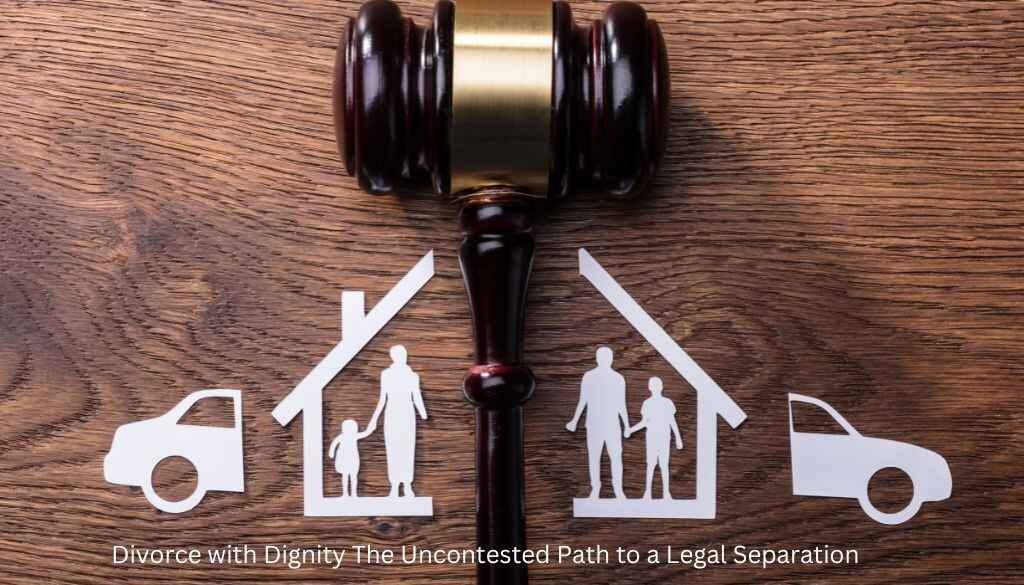Divorce is never easy. However, there are ways to make the process less painful and more dignified. Uncontested divorce offers couples an amicable path to legal separation, saving them time, money, and emotional distress. In this blog post, we’ll explore the benefits of choosing an uncontested divorce and provide insights into how you can achieve a fair agreement with dignity.
What is Divorce with Dignity?
Divorce with dignity is a process where both parties cooperate together amicably in order to have a fair and equitable agreement without the anger that usually comes with legal separation. It looks at mutual respect, clear communication and resolving differences cooperatively. This not only reduces the emotional burden on the individuals but also maintains a healthy atmosphere for children, if any. On the other hand, couples can go through their divorce easily by emphasizing cooperation rather than confrontation thereby reducing conflicts, financial hardship and tension hence allowing each person to proceed with his/her life in an encouraging and good way.
How to Understand the Rules of Divorce with Dignity
To understand these rules of divorce that enhances dignity, one must appreciate some key principles such as mutual respect and open communication. First of all, both parties should agree that they will prioritize friendly interactions and evade adversarial strategies which may increase bitterness among them. Secondly, it is essential to familiarize oneself with your jurisdiction’s requirements for an uncontested divorce since these can vary immensely. This implies understanding the paperwork involved, deadlines as well as any mandatory waiting periods.
Furthermore, they need to agree on being completely open about finances including properties as well as custody details such that decisions are taken out of informed consent. The input from mediators who specialize in uncontested divorces or legal professionals could also be very helpful in this case since they would enable discussions flow smoothly giving objective advices and ensuring a justifiable final agreement regarding laws related to family matters. Through commitment towards these regulations couples can find themselves divorced while maintaining their dignity thus creating possibilities for meaningful post-divorce relations even though it could be challenging at first.
Why An Uncontested Divorce?
Uncontested divorces occur when both parties agree on major issues such as distribution of properties, custody over children and making arrangements for support. This settlement is essential since it avoids prolonged litigation processes that are characterized by many couples feeling helpless about their future.
Financial Benefits
The major reasons why many people tend to go for uncontested divorces is the financial benefits that come along with it. When a divorce becomes contested and spreads from one judge to another, then the legal fees skyrocket thus burdening the couple financially. By choosing an uncontested divorce, partners can forego the expense linked with high court hearings and long-drawn-out lawful negotiations.
Emotional Well-being
Divorce is a traumatic process; however, an uncontested divorce minimizes stress and conflict in connection with litigation. Couples who work together in arriving at agreements enable a more positive environment and help make this transition easier for all concerned especially children.
Streamlined Legal Process
When compared to contested ones, uncontested divorces generally have faster movement through the legal system. The process may require just within months rather than years due to fewer court appearances and reduced documentation. This effectiveness allows them both moves on quickly with their lives again.
What is Uncontested Path to a Legal Separation?
An uncontested path toward legal separation refers to collaboration based model of marriage dissolution where both parties’ crucial points are settled outside of court. In this method of ending marriage, each spouse must reach an agreement on several issues including property division, alimony, child custody and support orders amongst others. In order for couples not be part of adversarial nature associated with complex divorces that end up being protracted lawsuits entailing huge monetary losses or intense emotional pain among parties involved; they should come into consensus out of court after having long deliberations regarding their standpoints for solving these controversial matters.
Such an approach would put emphasis on mutual respect allowing both parties to finalize their divorce fast and in good faith. The dignity of both individuals will be preserved since it is based on clear communication, respect and cooperation which are the main factors that lay foundation for an amicable divorce where neither party has to suffer. It is a beginning towards a healthy post-divorce relationship between the two adults, particularly when children are involved.
Steps to Ensure a Fair Agreement
Achieving a fair agreement in an uncontested divorce requires open communication and a willingness to compromise. Here are some steps to help ensure a balanced outcome:
- Open Dialogue: Maintain honest and respectful communication throughout the process.
- Consult Professionals: Seek guidance from attorneys, mediators, or financial advisors to help draft a fair agreement.
- Prioritize Children: Focus on the well-being of any children involved, ensuring their needs are met.
- Be Flexible: Be willing to make concessions and find common ground on contentious issues.
Requirements for an Uncontested Divorce
To qualify for an uncontested divorce, both parties must agree on all major issues. Additionally, they must meet the residency requirements of their state and complete the necessary legal forms. Consulting with a legal professional can help ensure all requirements are met and the process goes smoothly.
The Emotional Aspect of Divorce with Dignity
Divorce, even under the best of circumstances, is an emotionally complex process. By choosing the path of divorce with dignity, couples can reduce the emotional toll on themselves and their families. A key component of this approach is maintaining mutual respect and civility, which helps to mitigate feelings of resentment and anger. When emotions are managed thoughtfully, both parties can process their feelings in a healthier manner, allowing them to heal and move forward more effectively. Furthermore, this approach provides a more stable and reassuring environment for any children involved, ensuring that their emotional well-being is also considered. By embracing empathy and understanding, divorcing partners can navigate their separation with the compassion and dignity they both deserve.
Personal Stories of Uncontested Divorce
A Couple’s Amicable Agreement
John and Lisa managed to come to an amicable agreement despite their differences. By choosing an uncontested divorce, they avoided a lengthy and costly legal battle, paving the way for a peaceful separation.
Prioritizing Children’s Well-being
Sarah chose an uncontested divorce to prioritize her children’s mental health. This decision allowed her and her ex-spouse to co-parent effectively, showing that it is possible to separate with dignity and respect.
Financial Security through Streamlined Process
Mark, a professional, experienced the financial benefits of an uncontested divorce firsthand. The streamlined process allowed him to maintain a secure financial future without the burden of excessive legal fees.
Emotional Toll of Contested Divorce
Jane’s previous contested divorce was a harrowing experience. The constant conflict took a toll on her emotional well-being. In contrast, her subsequent uncontested divorce provided peace and closure, highlighting the benefits of an amicable separation.
Statistics on Uncontested Divorces
Uncontested divorces have become increasingly popular in recent years due to their numerous benefits. According to recent data, approximately 90% of divorces in the United States are resolved without trial, with many of these being uncontested divorces. This trend highlights the shift towards more amicable and cost-effective methods of ending a marriage. Studies have shown that uncontested divorces can be finalized in as little as three to six months, in contrast to contested divorces, which can take several years.
Furthermore, uncontested divorces are significantly less expensive, with costs averaging between $500 to $1,500, compared to $15,000 or more for contested divorces. These statistics underscore the growing preference for uncontested divorces as a means to achieve a quicker, less adversarial, and more affordable resolution to marital dissolution.
Addressing Common Misconceptions about Divorce with Dignity and Uncontested Divorce
Uncontested Divorce is Only for Amicable Couples
It is a popular misconception that only couples who keep friendly terms throughout the process can file for uncontested divorce. Nevertheless, cooperation and communication are necessary even if there may be little conflicts among the partners themselves. When done right, even parties with differing opinions can get an equitable mutual agreement because it does not have to be adversarial.
Uncontested Divorce Means Giving Up Rights
Some people fear that in case of uncontested divorce they might lose their rights as well or at least receive an unfair settlement from their former spouses. However, this is not true since with proper legal advice, one can ensure that they are accorded a fair portion of assets, appropriate alimony and child custody arrangements while also going through less acrimonious proceedings.
Divorce with Dignity is a Sign of Weakness
Choosing to divorce with dignity has been criticized as weak behaviour or avoiding dealing with critical issues. On the contrary, conflict resolution through respectful means requires great strength and maturity. It emphasizes emotional health and promotes better relationships after divorce particularly when children are involved.
Uncontested Divorce Lacks Legal Protection
An uncontested divorce does not have the same legal protections as one that goes to court – so many people believe. Nonetheless, individuals in such situations could still engage attorneys in ensuring that agreements reached are reviewed and personal interests protected. This alternative simply involves less courtroom drama but more negotiation.
Divorce With Dignity Neglects Children’s Needs
A dignified separation without all the bitterness normally fails to take into consideration the needs of innocent kids present during such moments according to many people’s views about such cases. Conversely though, this approach usually implies careful contemplation concerning how the young ones will be affected emotionally and financially hence giving priority to their best interest in coming up with any solution.
By debunking these misconceptions; it becomes clear that both divorce with dignity and uncontested divorce can offer respectful, efficient, and fair paths to marital dissolution. For all the children involved, these methods benefit those divorcing and help in creating a more positive environment.
Ratio of Divorce with Dignity Nowadays
This indicates the growing trend in modern society towards dignified divorces. The studies have also revealed a significant number of couples’ preference for uncontested divorces, which constitute the key element in their adherence to “divorce with dignity” philosophy. For instance, In America, it is estimated that over 90% of divorces are settled out of court with many falling under this category. There has been a shift indicating increased recognition of emotional, financial, and practical advantages arising from less confrontational and more amicable separation procedures. Consequently, contemporary couples are more likely to put dignity first especially for children involved thus making them search for conflict minimizing options based on mutual respect and understanding as well as focusing on each other’s worthiness. Thus, this evolving perspective on divorce mirrors an overall societal shift toward healthier ways of dealing with break-ups.
Future Prospects of Divorce with Dignity
As society moves forward, refusal to be dragged into a bitter legal tussle will increasingly become a thing that is acceptable about divorce. A rising awareness about mental health issues as well as emotional tolls associated with divorce among families may make myriad couples opt for amicable resolutions. It is anticipated that the legal framework will change to enhance mediation and other models of collaborative practice thereby discouraging an adversarial approach to divorce cases.
Technology will also play its part such that virtual mediation sessions could be used instead where online resources exist meaning there can be no excuse why one should not access these services on line if they need them or feel threatened by having face-to-face discussions with the spouse during negotiation process via attorneys at law.
Similarly schools will start promoting peaceful separations so that their students or kids grow in environments where every parent wants out but without any fighting hence everyone goes through it peacefully when they separate rather than fight it out in courts like today’s new generation wishes this was made possible through our own family experiences. These developments portend a future whereby marriages can be broken down without any bitterness whatsoever in order to preserve peace, minimize conflicts and focus on children who are always the most affected parties.
Impact of Divorce with Dignity on Children
Children are deeply affected and impacted negatively by their parents’ divorce; however, the latter aspect can be greatly avoided if it is done with dignity. The emotional health and stability of children should be prioritized in “divorce with dignity”, to put them at the heart of any process. The other way round for parents being respectful among them they can lower the suffering of their kids by minimizing emotional turmoil.
Such a method results into co-parenting relationship that is cooperative thus beneficial for psychological development in children as well as creating a secure and nurturing environment even after the family underwent changes. Also, limiting exposure to stressful courts disputes helps those kids in adjusting more easily to a new family arrangement minus conflict and anxiety over this matter. In simple terms, it means that child friendly separation gives way to a healthier atmosphere which assists minors in coping up with changing nature caused by parents’ split.
Legal Considerations in Divorce with Dignity
To embark on a “divorce with dignity” path, acknowledging the various legal considerations is important so as to ensure that both parties are adequately protected from any infringement of their rights and interests. Firstly, both individuals must be appreciative of the need for appropriate legal representation. In uncontested divorces, even as experienced family law attorneys are consulted for drafting and reviewing agreements, the terms should be fair enough. The expertise of legal professionals in such issues as property division, spousal support (alimony) and child custody is highly sought.
Marital assets and liabilities
One major legal consideration is how marital assets and liabilities shall be distributed fairly after divorce. Hence, the couple has to fully disclose all financial information including assets, debts, monthly income budgets and expenses among others .This makes it possible for each person’s share to be determined based on his or her contributionsto the joint estate and needs thereof. In case this is not appropriately documented and legally overseen by an attorney one spouse may inadvertently lose critical rights or properties.
Child custody and support require
In addition, child custody and support require careful deliberation in relation to law matters as well. When it comes to custody arrangements respect for children’s best interests should prevail over everything else.This means that custody agreements need also address physical and legal custody issues along with a visitation schedule between parents together with their joint financial obligations.Most importantly however,the said agreements should be capable of evolving since families naturally change yet strong enough not be broken.
Spousal support or alimony
Another important issue when divorcing with dignity revolves around spousal support or alimony.The amount of alimony depends on multiples factors such as length of the marriage,differences in earning capacities between respective couples,and current income generation capacity.Legal advice becomes crucial at this point due to need to agree on what can sustain them without issues in future about alimony rates.
Understand why mediation or collaborative law is significant
Moreover,couples ought to understand why mediation or collaborative law is significant.These processes encourage open communication and cooperative negotiation which are fundamental principles of a divorce with dignity. In mediation, a neutral third party helps in facilitating the discussions while collaborative law requires both parties to work together with their attorneys and reach a mutually satisfactory agreement. Both methods have an objective of minimizing conflict and court involvement.
legal considerations for dignified divorces are multifaceted
so, these legal considerations for dignified divorces are multifaceted and require careful planning as well as professional advice. A respectful separation can be achieved by placing emphasis on fair child custody and support arrangements, equitable asset division, and reasonable spousal support terms. Couples may require assistance from legal experts and should also consider choosing either mediation or collaborative law to ensure they get through this difficult stage in the fairest way possible.
This forward-looking method is focused on self-respect, emotional health and cooperation during the dissolution of a marriage. It is an increasing trend as society becomes more aware of mental health and the emotional issues surrounding breakups in families particularly children. Passionate about peace-mediated resolutions that are based on mediation and collaboration, conflict can be reduced by couples and traditional divorce suits can be avoided.
Legal concerns like fair allocation of resources, reasonable conditions for spousal support, child custody and maintenance help ensure justice devoid of any form unfairness or lack of respect for each other’s rights. Besides technological developments as exemplified through virtual mediation and educational programs that promote the inclusivity of this method among users too. Finally, it aims at establishing a better environment for all the parties involved so that they will always execute subsequent separations with dignity.
Summary
Divorce with dignity is a progressive approach that emphasizes mutual respect, emotional well-being, and cooperation during the dissolution of a marriage. This concept is gaining momentum as societal awareness about mental health and the emotional impact of divorce on families, particularly children, increases. By prioritizing amicable resolutions and leveraging mediation and collaborative law practices, couples can minimize conflict and reduce the adversarial nature of traditional divorce proceedings.
Legal considerations, such as equitable asset division, fair child custody and support arrangements, and reasonable spousal support terms, play a crucial role in ensuring a just and respectful process. Technological advancements, like virtual mediation, and educational initiatives further support the accessibility and acceptance of this approach. Ultimately, divorce with dignity aims to foster a healthier, more supportive environment for all parties involved, paving the way for future separations to be handled with grace and consideration.
FAQ’s
What does “Divorce with dignity” mean?
It is a way of referring to respectful and affable divorce, which puts the emotional health and stability of all the parties involved first (especially children). It stresses amicable co-parenting, fair legal agreements and reducing conflict in order to enable an environment in which children will be able to recover after separation.
How can couples ensure that assets are fairly divided?
The only sure way for couples to ensure that assets are fairly distributed among themselves is by providing full financial disclosure. Drafting and reviewing agreements that reflect equitable distribution cannot be done without experienced family law attorneys’ advice. Property division becomes simple as both parties must be taken care of based on their contributions and needs through a lawyer’s guidance.
What should a child custody agreement contain?
A comprehensive child custody agreement should contain provisions relating to physical custody, joint legal custody, visitation rights and financial responsibilities of parents. This document should serve the best interests of children while allowing some adjustment with time so as not to destabilize them completely. Legal assistance ensures the robustness of such agreements that clearly capture the intentionality of parents.
How is spousal support determined in a divorce with dignity?
Spousal support (also known as alimony) is computed using factors such as duration of marriage, income disparity between spouses, and earnings potential for each spouse. Legal professionals can help establish fair alimony terms that will prevent any future disputes or financial crisis based on what each party needs and is capable of paying for.
Roles played by mediation in divorce with dignity
Mediation refers to negotiation facilitated by third party neutral; it helps spouses come up with mutually acceptable deals. Divorce with dignity supports open communication and cooperative bargaining as exemplified by mediation. Mediation process aims at minimizing conflicts, reducing court involvement, fostering amicability.
Advantages associated with collaborative law in relation to divorces
Collaborative law allows both parties to work with their lawyers in order to negotiate terms out of court. This method calls for open talks and cooperation, which usually result to mutually fair treatments. Collaborative law process is helpful because it enables couples to secure their respective interests in a dignified manner.
How does divorce with dignity benefit children?
Divorce with dignity benefits children by minimizing their exposure to conflict and legal battles and ensuring that there is stability, support and predictable environment after family separation. Divorce with dignity emphasizes the emotional health and stability of children by fostering cooperative co-parenting and writing custody agreements that are based on them.
Are there technology advancements supporting a divorce with dignity?
Yes, virtual mediation and online collaborative law tools are among the technological advancements which have made divorces more amicable. They provide opportunities for couples’ resolution processes that are flexible especially when they want to address these issues reasonably. These e-tools facilitate convenient communication as well as negotiation, which makes the whole process less adversarial.






